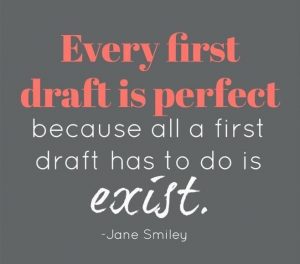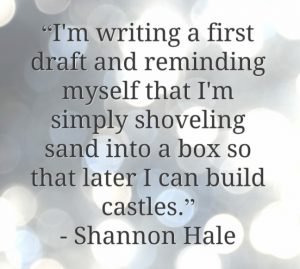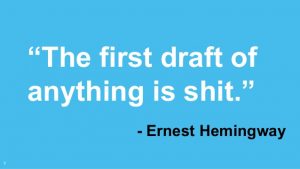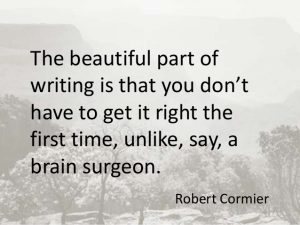One of the goals of my 100-day writing challenge has been to finish the first draft of a novel I started and abandoned years ago.
This project is a bit different than most first-draft-projects because I’m not starting with the blank page; instead, I’m wading through old work and editing, cutting, adding as appropriate. Still, the feelings that come up in this process (the doubt, anxiety, etc) are all very standard for a first draft. It’s both exciting and scary to work in a bubble (and most first drafts are, and should be, written in a bubble). Every day, I think, “What am I doing? Nobody is going to read this!” I decided to see what authors say about the infamous first draft to verify that these feelings are normal (spoiler alert: They are).

***
“For the first draft I need to know only enough to keep going. No more, no less.”
–Antoine Wilson
***
“It was a huge struggle. I’m not quite sure why I suffered to the degree I did while working on that book, but I do know that my work up to that point had been fairly conventional, and I didn’t know if anyone would accept this kind of book from me. It was almost as if I thought I’d be punished for it. I felt afraid as I worked on it. I thought it was terrible, that I was reaching too far.
At the same time, some of the most exciting moments I’ve had as a writer were during the writing of that book, even with all those worries and that feeling of doom. One day I read the first six chapters of the book in one sitting, and I tore out of the house and went running, and I had this sense that I’d never read anything quite like that before, that I’d done something really different. That was such a thrilling feeling — a rarity as I was working on it.”
–Jennifer Egan, on writing Look at Me
***

***
“My opinion is that you want to figure out character and plot in the first draft. I think it’s also a good idea to have the setting nailed down in the first draft, if possible; moving the narrative to another location can entail some pretty tedious rewrites. It’s also a good idea to figure out whether the book’s going to be in the first person or the third person as early on as possible, because changing pages and pages of text from one to the other is an insanely labor-intensive process.
My feeling is that you don’t need to waste your time obsessing over pacing in the first draft, because that’s the kind of thing that can change completely in revisions. In your first round of revisions you’ll inevitably end up cutting a lot of material, and that will change the pace of the book, so I think pacing is something best refined toward the end of the process.”
–Emily St. John Mandel
***
“I think almost nothing is worth sweating in the first draft. Does a character need to change genders? Do you want to shift the structure? Just do it, and keep moving forward. Finishing a draft of a novel is so hard, and so enormous, that one needs all the momentum possible. If you stop and go back to the beginning every time you want to change something, you will never finish. Just go go go! You will have the time to go back and fix all your mistakes, right your wrongs, etc. Just get to the end of the first draft. The feeling of accomplishment is sweet enough to spur you on to make even the most major changes in revision.”
–Emma Straub
***

***
“In the first draft I’m just trying to figure out what the story is or might be. I’m trying to learn the story, and trying to stay open to the possibilities that the original idea might be capable of generating. The only way to learn the story is by writing it, but how do you write it when you have only the vaguest notion of what the story is, and who the characters might be? That’s a problem. The problem, eh? The only way I learn it is by writing it line by line, page by page.
My expectations for first drafts are pretty low. I don’t worry about polishing the language at all, or fine-tuning character or plot. I’m basically just trying to figure out what the story might be.”
–Ben Fountain
***
“There’s a huge gap between what I need to know and what I do know when I begin a novel. If I waited until I knew at least thirty percent of what I should know before diving in, I think I’d be permanently stuck on the springboard. Normally (and I’m talking from the experience of a meager two books here) I know two things: a place and a person. The place is usually vivid. I could go on about it for pages. But the person is a cardboard cut out—two dimensional. Magician. Musician. Drunk. Shopkeeper. What I have to force myself to figure out is a single incident that sets the story in motion. It might be removed later on, but I need to pick one action which might cause this person to move about this place. Since I know so little about my character(s) when I first commit them to paper, I tend to overwrite them, cramming all sorts of overblown background detail into my first draft, which in turn drags down what little plot I initially have. My second draft is all about fixing that balance, pruning the obsessive background information and replacing it with more action in the novel’s present.”
–Ivy Pochoda
***

***
“For me, the first draft is really just a big mud-rolling, dust-kicking, mess-making time in which my only job is to find the story’s heartbeat. I allow myself to invent characters without warning, drop them if they prove to be uninteresting, change the setting in the middle, experiment with point of view, etc. I figure that the body will grow up around the heart, that it’s always possible to bring all the various elements up and down, sculpt and polish, as long as I’ve got something that matters to me. The second draft (and the 3rd through 20th, Lord help me) involves getting out the tool belt and thinking like a carpenter. But the first draft is all dirt and water and seeds and, hopefully, a little magic. Of course, this method means that my first draft is almost unreadable. Maybe someday I’ll invent a way of making a slightly cleaner mess, but until then, I try to enjoy the muck.”
–Ramona Ausubel
***
Ultimately, as daunting as first drafts can be, I’ve learned to enjoy them because the farther you get into the writing (and publishing) process, the more feedback you get from others, the less the book can feel like “yours.” In those beginning phases, it is completely yours.
Like Ben Fountain says above, you have the luxury of keeping expectations low with the first draft. Don’t fret too much about the exact language. Feel free to take the story in unplanned directions. Just enjoy getting the story OUT. If you get too in the weeds on the first draft, you’ll get overwhelmed and risk giving up. Trust that you’ll have time later to figure out nuances. There will be edits–so many edits. At some point, you will look back on the early days with a nostalgic smile, so try to enjoy those days while you’re in them.